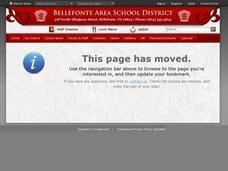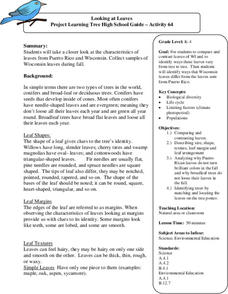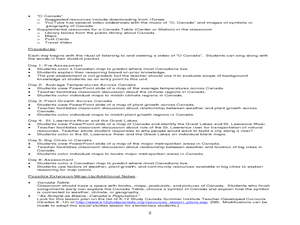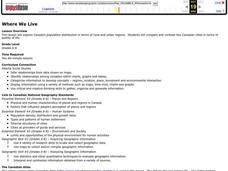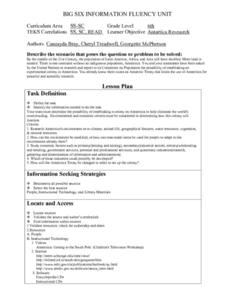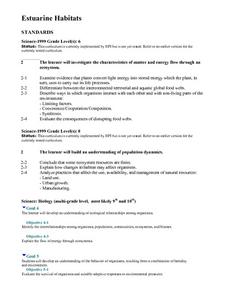Curated OER
Ecology and the Conservation of Natural Resources Lesson 2
Students compare and contrast abiotic and biotic factors. They discuss how these factors effect ecosystems. They answer questions to complete the lesson.
Curated OER
The Demographic Transition-A Contemporary Look at a Classic Model
Students evaluate and apply models to explain changes in global demographic patterns, and use their assessments to predict future needs.
Curated OER
A Coastal Arctic Food Web
Students create a food web of the arctic ecosystem. In this biology lesson, students explain how global warming affects this ecosystem. They explain how losing a species affects the entire community.
Curated OER
Food Web Follies
Seventh graders cut and paste animal pictures to create a food web and trace the path of energy. They write a paragraph explaining the importance of photosynthesis in all food webs.
Curated OER
"Oh Deer!"
Students play a game where half of them are deer and the others are components of habitat: food, water, shelter and space. They signify their needs by hand gestures and take what they need to their side of the game. They discuss real...
Curated OER
Migration Migraine
Students partipate in a demonstration in which they role play animals migrating between breeding and wintering habitats and encountering hazards at each end of the journey.
Curated OER
Animal Relationships
Students study energy pyramids, food chains and food webs. For this animal relationships lesson students complete several activities and play a game.
Curated OER
Looking At Leaves
Learners investigate the different leaves of Wisconsin. They gather samples of leaves in order to compare to the samples taken from Puerto Rico. They make observations and collect data recording the size, shape, and texture of the...
Curated OER
Native Species Restoration and its Impact on Local Populations
High schoolers watch video clips of ecosystems and answer questions relating to them.
Curated OER
Farming in a Fishbowl: How Ethnic Groups in
Seventh graders research Chinese agricultural needs and practices. They conduct an experiment with aquaculture and germinated rice as they take measurements and apply the scientific method.
Curated OER
Where Do Canadians Live?
Pupils investigate Canadian people by researching the geography of the country. In this world geography lesson, students identify locations within Canada with large populations based on their access to waterways. Pupils view and create...
Curated OER
Genetic Disorders with Cultural Roots: International Insects
High schoolers recognize that certain populations have specific genetic disorders that could benefit or harm them in their environment, work out punnett square problems and infer offspring probabilities from results, and provide...
Curated OER
Where We Live
Students analyze Canada's population distribution. They access online information to gather demographic information about two Canadian cities. They compare and contrast the quality of life in the two cities and present their findings.
Lubbock Independent School District
Antarctica Research
Sixth graders determine the possibility of establishing a colony on Antarctica to help eliminate the world's overcrowding. They consider environmental and economic criteria in determining how this colony functions ans is expected to do...
Curated OER
The Growth Of A City
Middle schoolers define what a city is. They investigate the top 10 - 15 most populated cities. SDescribe factors influencing the location and growth of urban sites. They site examples of cities that have grown with different models of...
Curated OER
Migration Woes
Students are able to describe the reproductive cycle of the gopher frog. They are able to describe the impacts of habitat loss and degradtion on gopher frog populations. Students are explained that many factors limit the survival of...
Curated OER
Saving the Bay
Learners investigate water pollution prevention. In this ecology wastewater lesson, students activate prior knowledge about sewage, then view a video explaining the waste water sewage system used in the San Francisco Bay area. Learners...
Curated OER
Fair Haven Community and the Grand Avenue Bridge
Young scholars use the internet to research the history of Fair Haven, Connecticut. In groups, they are introduced to the socio-economic developments and how the area has grown over time. They work together to create their own bridge...
Curated OER
Habitat Is Home
Young scholars are introduced to the concept and components of a habitat. They discuss the key components of a habitat and describe how certain factors can cause disturbances in a habitat and change its population. Activities are leveled...
Curated OER
The Lincoln-Douglas Debates of 1858: Interactive Map Activity
Students utilize an interactive map to explore the 1858 Senate campaign in Illinois. They examine how factors such as population, transportation, and party strongholds can affect campaign strategies. Students write an essay discussing...
Curated OER
The Lincoln-Douglas Debates of 1858: Interactive Map Activity
Eleventh graders utilize an interactive map to explore the 1858 Senate campaign in Illinois and how factors such as population, transportation, and party strongholds can affect campaign strategies.
Curated OER
Estuarine Habitats
Sixth graders study the important habitats, flora, fauna, and physical factors of coastal habitats. They compare the aquatic habitats to terrestrial habitats by researching and completing tables with the information.
Curated OER
Turtle Hurdles
Students participate in a simulation in which they discover the threats to sea turtles throughout the world. In groups, they act out the life cycle of a sea turtle and describe the stresses that threaten their survival. As a class,...
Curated OER
Ecological Organization
Students examine the concepts in the ecological organization unit. In this ecological lesson students explore news articles that have to do with the study of ecology.






